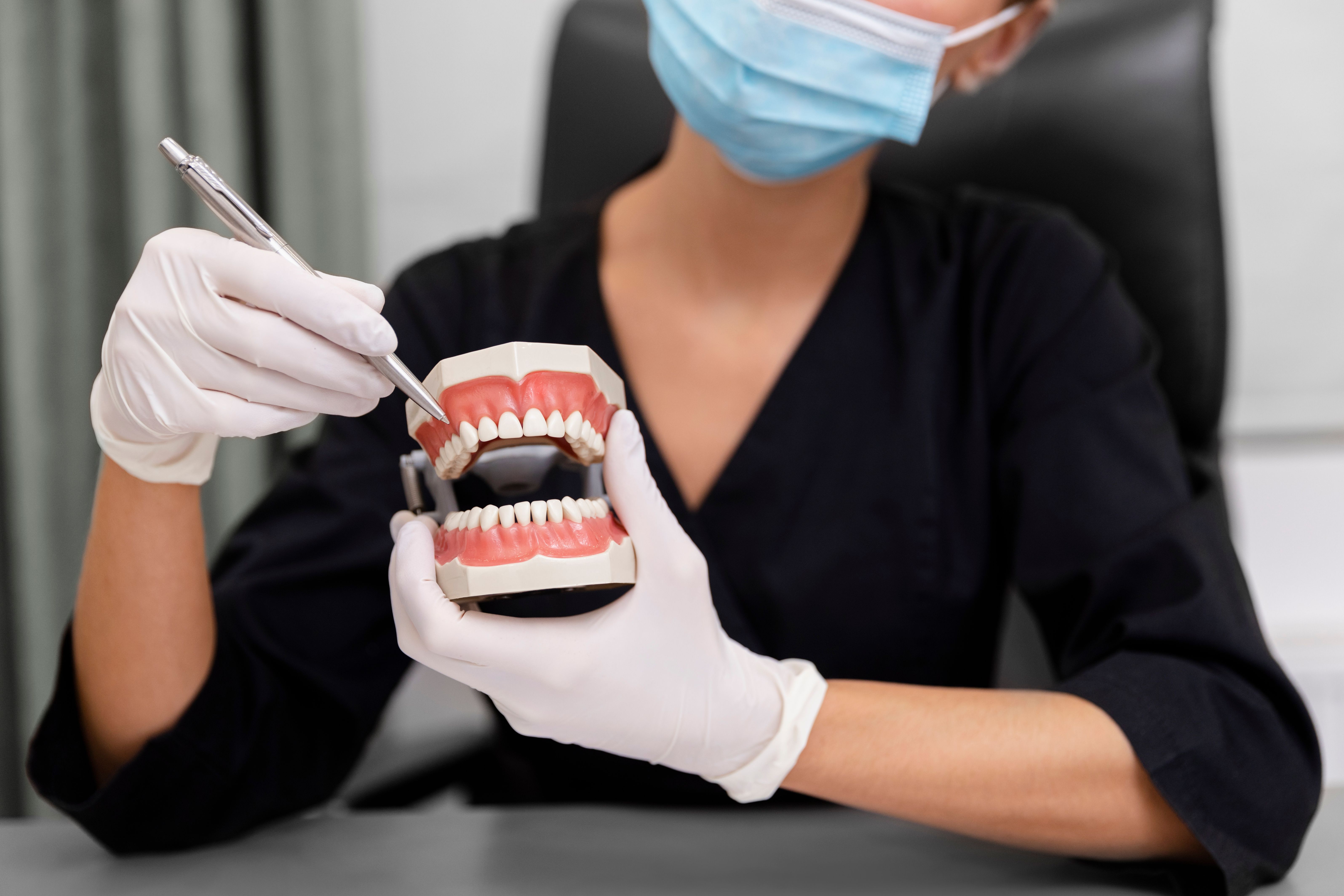October 17, 2025
How Medications Can Impact Your Oral Health (and What to Do About It)

Key Points
- Over 400 common medications can cause dry mouth, increasing cavity risk by up to 300%.
- Blood pressure medications and antidepressants are among the most common culprits affecting oral health.
- Medication-induced dry mouth affects 1 in 4 adults, significantly impacting dental health outcomes.
- Certain medications can cause gum overgrowth, bleeding, or delayed healing after dental procedures.
- 92% of adults taking multiple medications don't realize the impact on their oral health.
- Silver State Smiles provides comprehensive care for patients managing medication-related dental concerns.
Overview
If you take prescription medications regularly, they might be affecting your oral health in ways you never realized. While medications are essential for managing various health conditions, many common drugs have significant side effects that directly impact your teeth, gums, and overall dental wellness.
From dry mouth that dramatically increases cavity risk to gum tissue changes that complicate dental procedures, medication side effects represent a hidden threat to oral health that affects millions of people daily.
Silver State Smiles explores how common medications impact your dental health and provides practical strategies to protect your smile while continuing necessary treatments for your overall wellbeing.
1. Dry Mouth: The Most Common Medication Side Effect
Dry mouth, or xerostomia, is the most widespread oral health complication caused by medications. Over 400 prescription and over-the-counter drugs list dry mouth as a side effect.
Saliva plays a critical role in protecting teeth by neutralizing acids, washing away food particles, and providing minerals that strengthen enamel. Without adequate saliva flow, cavity risk increases dramatically, and gum disease becomes more likely.
Medications That Commonly Cause Dry Mouth
- Antihistamines and decongestants
- Antidepressants and anti-anxiety medications
- Blood pressure medications
- Pain medications including opioids
- Parkinson's disease medications
- Chemotherapy drugs
What You Can Do: Stay hydrated by sipping water throughout the day. Use alcohol-free mouth rinses and consider saliva substitutes or stimulants. Chew sugar-free gum with xylitol to stimulate natural saliva production. Schedule more frequent cleanings at Silver State Smiles to monitor for early signs of decay.
2. Gum Tissue Overgrowth from Specific Medications
Certain medications cause abnormal gum tissue growth, a condition called gingival hyperplasia. This overgrowth makes teeth harder to clean and increases infection risk.
The excess tissue creates pockets where bacteria accumulate, leading to inflammation, bleeding, and potential tooth loss if left untreated. This condition affects both function and appearance.
Medications Associated with Gum Overgrowth
- Calcium channel blockers for blood pressure
- Immunosuppressants like cyclosporine
- Anti-seizure medications including phenytoin
- Some contraceptive medications
3. Increased Bleeding Risk
Blood thinners and anticoagulants are essential for preventing strokes and heart attacks, but they significantly increase bleeding during dental procedures and even routine brushing.
Excessive bleeding can complicate dental treatments, delay healing, and require special precautions during procedures ranging from cleanings to extractions.
Common Blood-Thinning Medications:
- Warfarin (Coumadin)
- Aspirin therapy
- Clopidogrel (Plavix)
- Newer anticoagulants like rivaroxaban and apixaban
Always inform your dental team about blood thinners before any procedure. Never stop taking these medications without physician approval. Use a soft-bristled toothbrush to minimize gum trauma. Schedule dental work strategically when your medication levels are lowest, if medically appropriate.
4. Altered Taste Perception
Many medications can change how you taste foods, leaving metallic, bitter, or otherwise unpleasant sensations. This seemingly minor side effect can significantly impact nutrition and oral health.
Altered taste may lead to increased sugar consumption as people seek more flavorful foods, or it may cause people to avoid nutritious foods that support dental health.
Medications Affecting Taste
- Antibiotics, particularly metronidazole
- Blood pressure medications
- Chemotherapy drugs
- Antifungal medications
- Some diabetes medications
Maintain good oral hygiene to minimize taste changes. Try using plastic utensils instead of metal if you experience metallic tastes. Experiment with herbs and spices to enhance food flavor naturally. Stay hydrated and consider zinc supplements after consulting your physician.
5. Tooth Discoloration and Staining
Certain medications cause internal tooth discoloration that standard whitening treatments cannot address, while others promote external staining that compounds over time.
Tetracycline antibiotics are notorious for causing permanent gray or brown discoloration when taken during tooth development, but many other medications also affect tooth color in adults.
Discuss medication alternatives with your doctor if staining becomes problematic. Maintain excellent oral hygiene and consider professional whitening treatments. For severe tetracycline staining, Silver State Smiles offers cosmetic solutions including veneers or bonding.
6. Bone Density Changes
Bisphosphonates used to treat osteoporosis and certain cancers can significantly affect jawbone health, leading to a serious condition called osteonecrosis of the jaw (ONJ).
This rare but serious complication involves jawbone death and can be triggered by dental procedures, particularly extractions or implant placement.
Inform your dentist immediately if you're taking bisphosphonates or similar medications. Complete necessary dental work before starting bisphosphonate therapy when possible. Maintain excellent oral hygiene to minimize infection risk. Your team at Silver State Smiles will take special precautions during any invasive procedures.
The Importance of Communication
The single most important step in managing medication-related oral health issues is open communication between your medical team and dental professionals.
Many patients don't realize they should inform their dentist about medications, supplements, and over-the-counter drugs they take regularly. This information is critical for preventing complications and providing appropriate care.
Silver State Smiles maintains comprehensive medical histories and stays current on medication interactions to provide the safest, most effective dental care for patients with complex medical needs.
When to Seek Immediate Dental Care
Contact Silver State Smiles promptly if you experience:
- Sudden increase in tooth sensitivity
- Persistent dry mouth that doesn't improve with interventions
- Bleeding gums that don't stop with gentle pressure
- Swelling or growths in your mouth
- Unexplained tooth pain or loosening
- Sores that don't heal within two weeks
- Difficulty chewing or swallowing
Working with Your Healthcare Team
Managing medication-related oral health issues requires collaboration between your dentist, physician, and pharmacist.
Don't hesitate to ask your doctor about alternative medications if side effects become problematic. Many conditions can be treated with multiple drug options, and some may have fewer oral health implications.
Similarly, your dentist can modify treatment approaches, recommend specific products, and provide additional preventive care based on your medication regimen.
Conclusion
Understanding how medications impact your oral health empowers you to take proactive steps to protect your smile. While you may need these medications for essential health management, you don't have to accept compromised dental health as an inevitable consequence.
Through awareness, enhanced preventive care, open communication with healthcare providers, and professional dental support from Silver State Smiles, you can maintain excellent oral health while managing your medical conditions effectively.
Remember that medication side effects affecting your mouth are not something you simply have to tolerate. With the right strategies and professional guidance, you can minimize these impacts and maintain a healthy, beautiful smile for life.

Schedule Your Visit Today
Experience exceptional dental care in a comfortable, state-of-the-art environment. New patients welcome!
